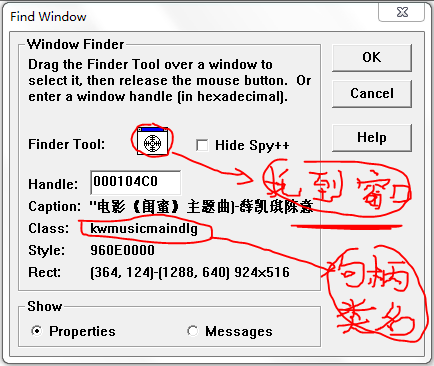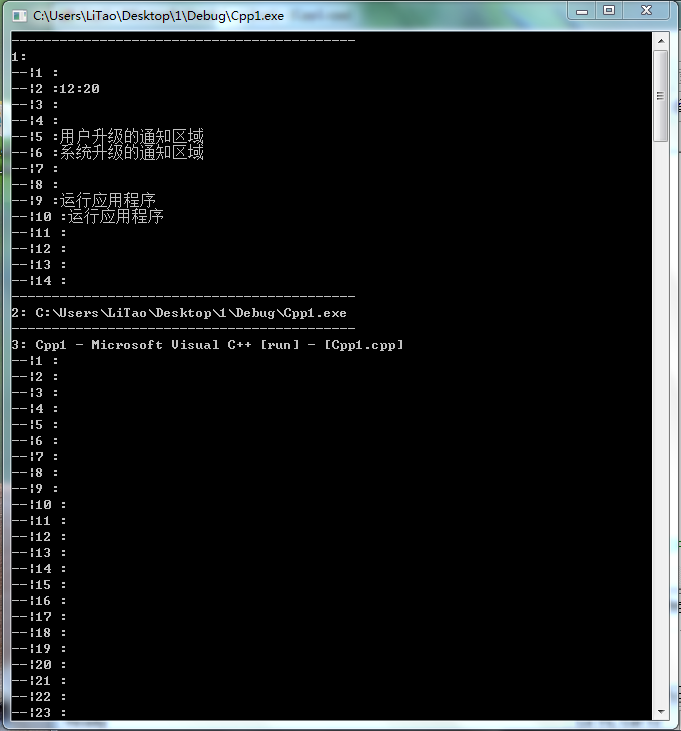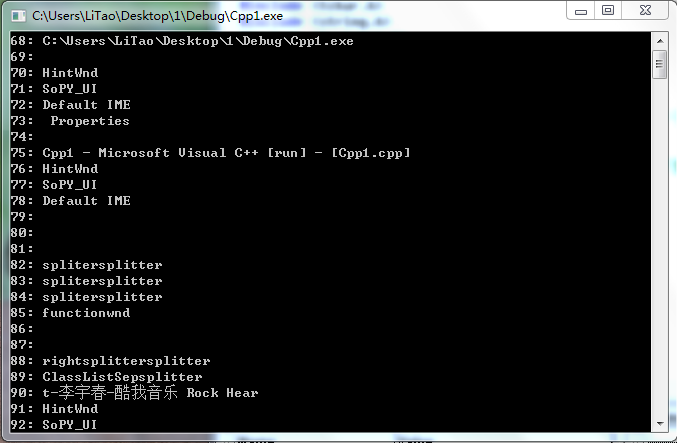1、使用FindWindow函数获取窗口句柄
示例:使用FindWindow函数获取窗口句柄,然后获得窗口大小,并且移动窗口到指定位置。
我们想获得酷我音乐盒的窗口句柄并移动它,该怎么办呢?

首先打开VC或者VS里面tool中的SPY++点击查找窗口如下:
PS:把那个靶心似的的东西移动到想查找的窗口上,这里是酷我音乐盒,下面会出现窗口的信息,包括窗口的句柄、名字、类、类型、大小和位置。点击OK还有更多信息~

PS:因为FindWindowA(LPCSTR lpClassName ,LPCSTR lpWindowName);既可以通过窗口类名又可以通过窗口名称查找窗口句柄,如果只知道一个就把另一个写成null.这里我们会发现它的窗口名称会随着播放的歌曲的变化而变化,所以通过窗口名来查找窗口句柄是不明智的(不过我们可以通过窗口名字获得当前播放音乐的名称哦!),因此我们用窗口类名获得窗口句柄。
哈哈,剩下2个函数都很简单,看看应该能够理解,俺就不介绍啦~
1 #include <Windows.h> 2 #include <stdio.h> 3 #include <string.h> 4 #include <iostream.h> 5 6 int main(int argc, char* argv[]) 7 { 8 //根据窗口类名获取酷我音乐窗口句柄 9 HWND hq=FindWindow("kwmusicmaindlg",NULL); 10 11 //得到酷我音乐窗口大小 12 RECT rect; 13 GetWindowRect(hq,&rect); 14 int w=rect.right-rect.left,h=rect.bottom-rect.top; 15 cout<<"宽:"<<w<<" "<<"高:"<<h<<endl; 16 17 //移动酷我音乐窗口位置 18 MoveWindow(hq,100,100,w,h,false); 19 20 //得到桌面窗口 21 HWND hd=GetDesktopWindow(); 22 GetWindowRect(hd,&rect); 23 w=rect.right-rect.left; 24 h=rect.bottom-rect.top; 25 cout<<"宽:"<<w<<" "<<"高:"<<h<<endl; 26 27 return 0; 28 }
>_<:这里GetWindowRect函数可以获得窗口矩形,根据窗口矩形可以计算窗口大小;MoveWindow可以将窗口移动到指定位置而且第4、5个参数还能修改窗口大小哦!
>_<:下面我又蛇添足加了个获得桌面的大小的操作~
2、获取所有顶层窗口以及它们的子窗口
示例:使用EnumWindows和EnumChildWindows函数以及相对的回调函数EnumWindowsProc和EnumChildWindowsProc获取所有顶层窗口以及它们的子窗口
注意:有些窗口做了特殊处理,比如QQ是不能通过这个方法获得的!

>_<:如上图,有些窗口没有名字,所以显示为空~
1 #include <Windows.h> 2 #include <stdio.h> 3 #include <tchar.h> 4 #include <string.h> 5 #include <iostream.h> 6 7 int Pnum=0,Cnum;//父窗口数量,每一级父窗口的子窗口数量 8 9 //--------------------------------------------------------- 10 //EnumChildWindows回调函数,hwnd为指定的父窗口 11 //--------------------------------------------------------- 12 BOOL CALLBACK EnumChildWindowsProc(HWND hWnd,LPARAM lParam) 13 { 14 char WindowTitle[100]={0}; 15 Cnum++; 16 ::GetWindowText(hWnd,WindowTitle,100); 17 printf("--|%d :%s ",Cnum,WindowTitle); 18 return true; 19 } 20 //--------------------------------------------------------- 21 //EnumWindows回调函数,hwnd为发现的顶层窗口 22 //--------------------------------------------------------- 23 BOOL CALLBACK EnumWindowsProc(HWND hWnd,LPARAM lParam) 24 { 25 if(GetParent(hWnd)==NULL && IsWindowVisible(hWnd)) //判断是否顶层窗口并且可见 26 { 27 Pnum++; 28 Cnum=0; 29 char WindowTitle[100]={0}; 30 ::GetWindowText(hWnd,WindowTitle,100); 31 printf("------------------------------------------- "); 32 printf("%d: %s ",Pnum,WindowTitle); 33 EnumChildWindows(hWnd,EnumChildWindowsProc,NULL); //获取父窗口的所有子窗口 34 } 35 return true; 36 } 37 //--------------------------------------------------------- 38 //main函数 39 //--------------------------------------------------------- 40 int main() 41 { 42 //获取屏幕上所有的顶层窗口,每发现一个窗口就调用回调函数一次 43 EnumWindows(EnumWindowsProc ,NULL ); 44 getchar(); 45 return 0; 46 }
3、使用GetDesktopWindow和GetNextWindow函数得到所有的子窗口
PS:这样遍历之后就可以找到你想要的窗口句柄啦(不要做坏事呀!哈哈~)

1 #include <Windows.h> 2 #include <stdio.h> 3 #include <tchar.h> 4 #include <string.h> 5 #include <iostream.h> 6 7 int main() 8 { 9 HWND hd=GetDesktopWindow(); //得到桌面窗口 10 hd=GetWindow(hd,GW_CHILD); //得到屏幕上第一个子窗口 11 char s[200]={0}; 12 int num=1; 13 while(hd!=NULL) //循环得到所有的子窗口 14 { 15 memset(s,0,200); 16 GetWindowText(hd,s,200); 17 cout<<num++<<": "<<s<<endl; 18 hd=GetNextWindow(hd,GW_HWNDNEXT); 19 } 20 getchar(); 21 return 0; 22 }
参考链接:http://blog.csdn.net/dazhong159/article/details/7903382